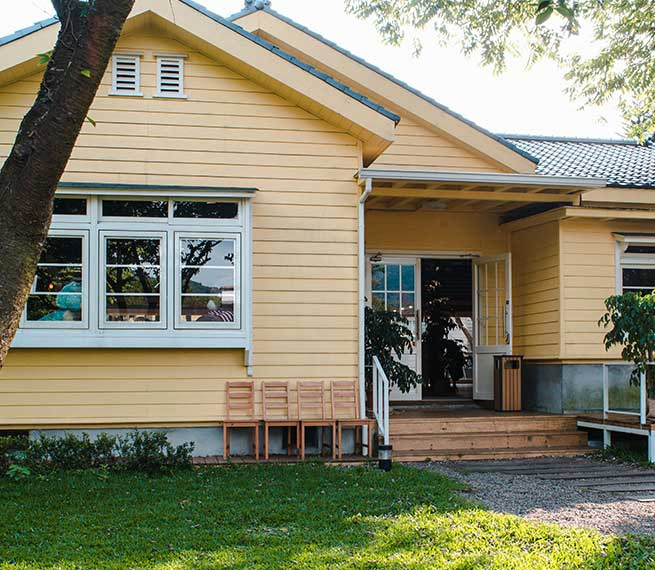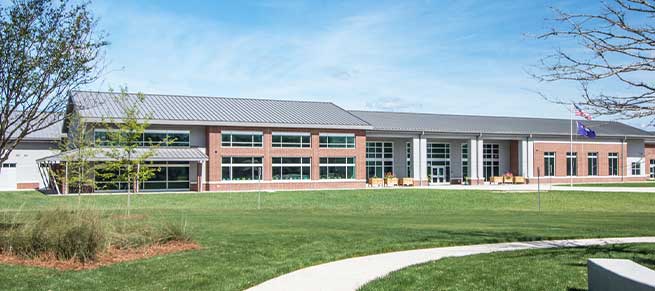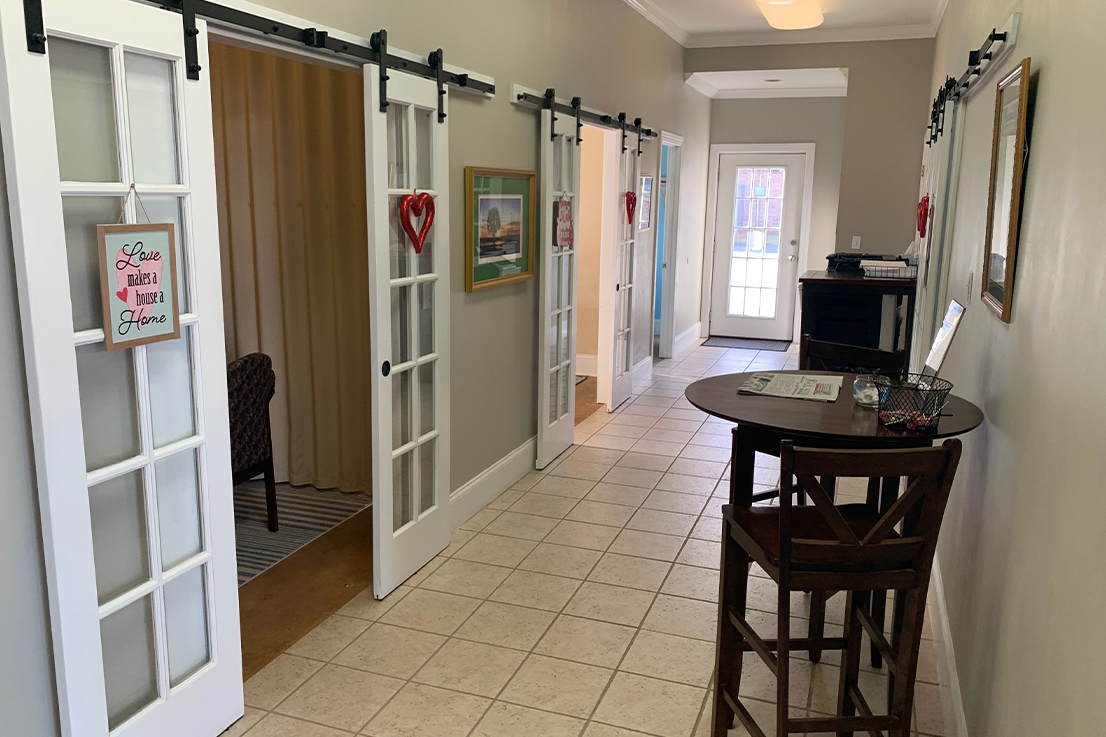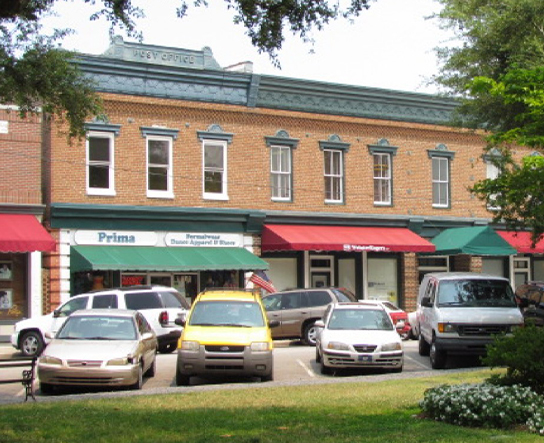Discover the Top Real Estate Agent in Summerville, SC
Buying or selling a home is a big deal. When it comes to making one of the largest financial decisions in your life, it's crucial to have a trusted advisor by your side. Someone who does what is best for you and your family, listens to your needs and does everything possible to help you achieve your goals. While most home buyers and sellers crave the same guidance from their real estate professionals, their specific real estate needs will always be different.
If you have been looking for a real estate agent who understands the delicate balance between the two, look no further than Hillary Jones. With more than 15 years of real estate experience under her belt, Hillary brings a unique set of client-centric skills to the table. Unlike some big box firms out there, Hillary provides personalized, one-on-one real estate services to all her clients. This boutique approach lets Hillary spend more time with clients, whether it's giving a house tour or finding the hidden gem of their dreams.
Hillary takes pride in knowing Tea Farm, SC neighborhoods like the back of her hand, from new homes for sale in Tea Farm neighborhood in Summerville, SC to secluded riverfront properties off the beaten path. She will work closely with you to discover the exact type of home you're interested in buying while always considering your budget.
Why do so many home buyers trust Hillary? She knows that the most important real estate transaction is yours. As such, she works tirelessly to exceed expectations.

Here are just a few more reasons why real estate clients trust Hillary Jones:
- 15+ Years of Real Estate Experience
- Always Working for Your Best Interests
- Expert Negotiator
- Loyal, Confident, and Capable
- Always Accessible Via Email or Phone
- Always Up to Date on Market Trends and What They Mean to You
- Expert at Writing Strong, Enforceable Contracts
- Well Connected
- Access to Many Homes for Sale in Dozens of Neighborhoods
- Stress-Free Service: You've Got Enough on Your Plate!
- Available Every Step of the Way, Even After Closing

Peaceful Living
Community designers chose to focus on a peaceful community atmosphere when creating this neighborhood. Homes are not stacked on top of one another but are also close enough to create a sense of community. Here, residents live, work, play, and gather while never being too far away from major thoroughfares. The neighborhood's layout helps reduce on-road traffic, encouraging alternative methods of travel like walking and biking.
The community plan sidewalks and beautiful spaces for residents to enjoy, creating meaningful ties to Mother Nature. With gorgeous walking and biking trails nearby, residents have the chance to enjoy natural features without having to travel to a national park.
If living close to nature in a community-based environment sounds like the perfect place to live, Tea Farm neighborhood in Summerville, SC should be high on your list.
Schools

Schooling is important to the residents of Summerville, SC, with the community being close to many of the area's highest-ranking K-12 schools. If you have younger children, you will love the local education system and pre-K options for younger kids. Local high schools are also great, and feature many course options with purpose-driven curriculums and over-achieving teachers. During your tour of this Tea Farm neighborhood in Summerville, SC, be sure to ask Hillary Jones about the elementary, middle, and high school options for learning.
Crime Rate

Crime is always a factor no matter where you live, but if you're concerned about criminal activity in this Tea Farm neighborhood in Summerville, SC, you don't have much to worry about. Recent statistics show that Summerville, SC has lower crime rates than other cities in South Carolina. That is great news if you're looking to buy a home in the next year, especially if you have younger children. If you're looking for a peaceful place to live with excellent nearby schools and lower than average crime rates, look no further than this popular neighborhood in Summerville, SC.

Homes for Sale Tea Farm neighborhood in Summerville, SC
Tea Farm neighborhood in Summerville, SC is a well-established neighborhood nestled in Summerville, SC - one of the most popular cities to live and play in in South Carolina. After spending some time in this gorgeous community, you will get a true sense of comfort and belonging here. You get the feeling that everything is well looked after and that residents are happy - because both are true.
in Tea Farm neighborhood in Summerville, SC was designed to give residents access to everything they could want or need without driving all over Summerville, SC. Located a short driving distance from the highway, Tea Farm neighborhood in Summerville, SC features unique recreation opportunities, shopping, top-ranked schools, and even healthcare, all within driving distance of the neighborhood. Community developers created the layout of this neighborhood in Summerville, SC with convenience and comfort in mind. When you live here, you can enjoy an abundance of trees, shrubs, walking trails, well-lit streets, and more.
A few reasons why home buyers put Tea Farm neighborhood in Summerville, SC at the top of their lists include:
The Trail System

Designed for families and their children to get outside and play, in Summerville, SC trail system winds its way throughout the neighborhood, giving residents an easy way to get out and get exercise. Kids love to explore these trails, and parents love to let them get a break from sitting in front of their iPad all day. Adults enjoy the trails too, and use them for walking with friends, running, or simply meandering through Tea Farm neighborhood in Summerville, SC.
Sense of Community

The Tea Farm neighborhood in Summerville, SC designers wanted to give residents plenty of room to "stretch out" while also creating a palpable sense of community. So, you won't have to walk a mile in the snow to get a cup of sugar from your neighbor. On the other hand, residents and their lots are well-spaced apart, maintaining privacy. Residents in the Tea Farm neighborhood in Summerville, SC neighborhood are close-knit, and very welcoming to new homeowners. If you have children, you should set up a date and time to tour Tea Farm neighborhood in Summerville, SC with Hillary Jones, who can point out popular features and home plans.
Summerville, SC YMCA

One of the most sought-after amenities Summerville, SC is the family YMCA. This massive complex was created to give local residents a fun, easy way to enjoy recreation with friends and family. Features include modern exercise equipment, walking tracks, tennis and basketball courts, a softball field, an aquatics complex, and even wellness and health programs. Sign your child up for Summerville, SC camp, or even try learning a new sport to keep you active on the weekends!
Healthcare

Access to healthcare options in Summerville, SC is plentiful and located within a few miles' drive. Healthcare providers include:
- Primary Care Options
- Orthodontic Practices
- Family Dentistry Offices
- Chiropractic and Massage Therapists
- Assisted Living Facilities
- Eye Care Centers
Shopping

One of the biggest reasons why so many home buyers settle on Summerville, SC is the extensive access to shops and services, all located just a short drive from the neighborhood.
Shopping and convenience options include:
- Popular grocery store chains
- Restaurants offering breakfast, lunch, and dinner options from names like Starbucks and Chick-Fil-A, and more.
- Gas stations and convenience stores for re-fueling and quick snacks.
- Personal services like nail salons and spas for relaxation.
- Financial services for taxes and investing.
- Preschool and childcare options for families.
Real Estate
in Tea Farm neighborhood in Summerville, SC
Awarded "Best Community" by Summerville, SC Choice Awards, Tea Farm neighborhood in Summerville, SC is located where 53,000 acres of land have been placed under density restriction. If you're looking for a neighborhood with a secluded feel that is close to nature but also nearby the conveniences of modern life, you're in luck. Tea Farm neighborhood in Summerville, SC offers restaurants, shops, and entertainment options nearby, and should be on your list of communities to tour with Hillary Jones. Unlike many newer neighborhoods, Tea Farm neighborhood in Summerville, SC does not have a "cookie cutter" feel at all. Instead of congested sidewalks and small lots, Tea Farm neighborhood in Summerville, SC boasts plenty of room to live and a variety of floor plan options.
Homebuyers choose Tea Farm neighborhood in Summerville, SC for many reasons, including:

1.
Family-Friendly
One of the most cited reasons for moving to Tea Farm neighborhood in Summerville, SC is the fact that it is family friendly. Here, kids love to gather outdoors and play, socialize, and make new friends that last for a lifetime. This neighborhood's family-friendly atmosphere makes carpooling easy, especially if your kids are in children's programs with neighbors. Expect warm smiles and hearty hugs when you move here, as the current residents are very friendly and welcoming. If you don't currently have kids but want to start a family in the future, this neighborhood in Summerville, SC is a fantastic place to raise a child.

2.
Outdoor Activities
If you love to soak up the sun and spend your free time in the great outdoors instead of cooped up inside, this neighborhood in Summerville, SC is a great choice. Whether you want an easy-to-find walking trail for a leisurely stroll a wooded hiking trail, you can find plenty of options close by. If you would rather hit the gym over walking or running, you can choose from several gyms in the local area. If you don't feel like driving a short way's away, you can always take a nice walk around this gorgeous neighborhood in Summerville, SC. When you live here, you will have easy access to many outdoor activities, all within a short driving distance.
Some local outdoor activity options include:
- Hiking
- Biking
- Walking
- Fishing
- Swimming
- Camping
- More

3.
Schools
Perhaps the most cited reason for buying a home in Summerville, SC is the unique access to schools. Whether your child is just getting started in the school system or is a junior in high school, the education programs in Summerville, SC are excellent. Ranked among some of the best schools in the state, there are options for pre-K students all the way up to high schoolers. Students that attend school in Summerville, SC love the teachers, their fellow students, the classes offered, and the after-school activities to advance their sports skills and education.
Many parents choose to enroll their kids in the Dorchester 2 school district, which has received acclaim as one of the best school districts available.

Find Your Forever Home
with Hillary Jones
If you are thinking about buying real estate in Summerville, SC, we would like to invite you to our office and welcome you to our community. As a local for nearly two decades, Hillary Jones knows the Lowcountry like the back of her hand. From local market knowledge to contract negotiations, Hillary is committed to unmatched real estate excellence. It doesn't matter if you have a few questions or are ready to buy your dream home - if quality real estate service is what you need, you will find it here.
Everyone knows the home buying process can be challenging, but as your advocate, your experience will be seamless and stress-free. Give our office in Summerville, SC, a call today to learn more about how Hillary puts the "real" back in real estate.
 843-709-4666
843-709-4666
Free Consultation
Latest News in Tea Farm, SC
Table Rock Tea Company: Visit an Authentic Tea Farm Right in the Upstate
Kristina Hernandezhttps://kiddingaroundgreenville.com/table-rock-tea-company
Did you know that you can visit Table Rock Tea Company to learn about tea right in Upstate, SC? This authentic tea farm is only a 45-minute drive from Greenville, SC, grows, processes, and sells tea. We went for a tour to learn about all that’s brewing at Table Rock Tea. Within the first five minutes of our awesome tour at Table Rock Tea Company, my mind was blown. I can’t tell you what it was exactly that did it because it’s a fun fact that Jennifer, the owner, loves to tell guests, but it’s only the ...
Did you know that you can visit Table Rock Tea Company to learn about tea right in Upstate, SC? This authentic tea farm is only a 45-minute drive from Greenville, SC, grows, processes, and sells tea. We went for a tour to learn about all that’s brewing at Table Rock Tea.
Within the first five minutes of our awesome tour at Table Rock Tea Company, my mind was blown. I can’t tell you what it was exactly that did it because it’s a fun fact that Jennifer, the owner, loves to tell guests, but it’s only the beginning of learning all about how tea is grown and processed right here in the Upstate of South Carolina.
Table Rock Tea Company
Table Rock Tea sits directly under the shadow of the massive Table Rock Mountain in Pickens County, just a short 45-minute drive from Greenville. I actually missed the turn to the tea company because I was ogling the houses on the road and their views of the mountain.
The owners of the farm, Jennifer and Steve Lorch, have lived in the Upstate for more than 20 years but have only been tea farmers for the last seven years. They began tea farming after learning about it while in Kenya doing work with their non-profit, Hydromissions International, which helps to dig wells and provide clean water sources.
Steve and Jennifer have several acres of land they have been cultivating and are adding more and more little tea plants every year. Tea plants, named Camellia Sinensis, take three years to grow and produce the growth needed to make green, oolong, black, and white teas.
Jasmine, their sweet dog who goes by the name Jazzy, greets visitors and is the mascot for all the labels on the tea bags and boxes. My kids are a little scared of dogs but they loved her and we enjoyed having her follow us around.
You can purchase the teas online or in person.
Tours at Table Rock Tea Company
Going on a tour of a legitimate tea farm right here in the Upstate was a lot of fun. I really didn’t know what to expect because 1) I knew nothing about tea honestly, 2) I had no idea tea is grown so close to where I live, and 3) I had never been to a tea farm.
Jennifer has a wealth of knowledge about tea farming and it was fascinating to learn about the origins of the farm, about how the different kinds of tea are processed (get ready to learn about oxidation, yay, science!), how huge the seeds of the tea plant are, and how the farm germinates the seeds.
“I want the Upstate to be known for its tea,” Jennifer told me.
You walk around parts of the farm where the plants are grown, inside the huge greenhouse to learn about seed germination and then into the processing area where the tea magic happens. One bit of magic is their Winter Leaf green tea, which is the only cold-harvested green tea in the world. Unreal, right? South Carolina has some amazing farmers.
Tours last about an hour but can be a little shorter depending on the attention span of your kids. I was surprised at how my kids (ages 11 and 7) got into it after their initial hesitation about learning about tea, something they don’t even drink. It was a fun and educational homeschool field trip for us.
Tours happen Thursday – Saturday at 10 am and Thursday – Sunday at 2 pm. You must reserve your tour spot by calling the farm at 864.915.0571.
Field Trips at the Tea Farm Near Greenville
Speaking of field trips, Table Rock Tea Company offers them for all kinds of groups – homeschool, retirement homes, scouts, anyone really. Tours are free except for larger homeschool groups, where it’s just $1/kid.
Tours last about an hour but can be shortened depending on how long kids will pay attention. Kids will learn about botany, science, and math – perhaps more if you’re the creative homeschooling parent kind!
Volunteering
Last year, the farm surpassed more than 1,000 hours of volunteering, which is quite an accomplishment. They rely on their volunteers for packing and planting the tea and are grateful for any help.
If you want to volunteer, call Jennifer and ask to be put on her group text message. She sends them out every Monday telling volunteers what they will be doing on Tuesday. People who want to volunteer come Tuesdays from 9 am – Noon and help out on the farm. Any age is welcome!
Table Rock Tea Consortium
In Jennifer and Steve’s quest to make the Upstate known for its tea, they offer a consortium of tea growers. If you want to join, you purchase the tea plants and grow them at your own house or farm or whatever you have and then pick the leaves (actually called a flush when it’s ready to be picked – see, I learned something) and bring them to Table Rock Tea Company. The farmer/hobbyist will be paid for the leaves so they get paid to grow tea!
Table Rock Tea Company provides members of the consortium with the expertise and knowledge to grow and maintain the tea plants. The tea plants are pretty easy to grow and maintain since they have no predators because animals don’t like to eat the leaves, which contain caffeine. The plants from Table Rock Tea that are sold are already one and a half years old and will be ready to harvest at around three or four years old. And they are pretty plants, with flowers in the fall! You can learn more about the Table Rock Tea Consortium at the website.
Tea Museum
New in 2023 is a beautiful tea museum and bathrooms. They have all kinds of neat tea-related old school machines and you can smell each of their teas that they have available for purchase. There are plenty of chairs for tours and a TV screen that Jennifer uses to point out cool facts about tea.
There are picnic benches outside the tea museum with a large field, perfect for throwing around a football after your tour.
Make it a day trip
The Table Rock Tea Company is minutes from Table Rock State Park, which has miles of hiking trails, a lakeside beach and swimming, and a playground. Jones Gap and Caesars Head State Parks are nearby, as is Wildcat Wayside, the roadside waterfall popular for wading in the summer.
Travelers Rest and Easley are both nearby, which have lots of great places to eat and playgrounds. And Flat Rock, NC is about 45 minutes away, where you can hike and play with goats at the Carl Sandburg Home.
Table Rock Tea Company118 High Hills Lane, Pickens864.915.0571 Hours: Thursday-Saturday 9 am – 5 pm, Sunday 1-5 pm. Tours are Thursday-Saturday at 10 am and Thursday – Sunday at 2 pm.
Looking for more? Discover more amazing adventures and fabulous family fun in our full guide to Things to Do in the Upstate.
SC annuls Oli Cabinet's decision to allow swapping of Giri Bandhu Tea Estate land
Bal Krishna Sahhttps://thehimalayantimes.com/nepal/sc-annuls-oli-cabinets-decision-to-allow-swapping-of-giri-bandhu-tea-estate-land
Nepal "These issues raise serious questions in relation to the country's land governance, transparency, and the rule of law"KATHMANDU, FEBRUARY 7The Supreme Court annulled then-KP Sharma-led government's decision to allow Giri Bandhu Tea Estate to relocate its 343-19-12 bigha land to a different location.A constitutional bench of the Supreme Court comprising Chief Justice Bishowamb...
"These issues raise serious questions in relation to the country's land governance, transparency, and the rule of law"
KATHMANDU, FEBRUARY 7
The Supreme Court annulled then-KP Sharma-led government's decision to allow Giri Bandhu Tea Estate to relocate its 343-19-12 bigha land to a different location.
A constitutional bench of the Supreme Court comprising Chief Justice Bishowambhar Prasad Shrestha, Justices Ishwar Prasad Khatiwada, Prakash Man Singh Raut, Sushma Lata Mathema and Sapana Pradhan Malla delivered the verdict in response to a writ petition filed separately by Advocate Om Prakash Aryal, Om Prakash Mishra, Bhaktaraj Bharati and others.
The constitutional bench did not declare some provisions of Land Act, 1964 particularly Section 12 (c), 12 (e), Rule 16a of Land Regulations and Schedule 5 ultra vires as claimed by the petitioners, but ruled that the Oli government's decision taken on April 26, 2021 to allow Giri Tea Estate to relocate, was not consistent with the provisions of Land Act, including Section 12 (c). The court ruled that generally land above the ceiling must be confiscated. The court issued a writ of mandamus to the government telling it to manage the land keeping in mind the area of land, capacity of estate to grow tea, and guarantee of getting proportional land in the case of land swap and the price of the land. The court will deliver the full texts of the verdict later.
A certiorari order to revoke the Cabinet decision and any work carried out in accordance with it was issued by the constitutional bench of the Supreme Court because it was determined that the controversial Cabinet order allowing the exchange of the tea estate's land was immature and in violation of section 12(c) of the Lands Act 1964 and other legal provisions.
"The court has revoked the Oli government decision by maintaining the status quo of the Giri Bandhu Tea Estate Land," Petitioner Advocate Om Prakash Aryal told THT.
Additionally, attempts to build commercial buildings on the Tea Estate Land have been halted by the decision.
Aryal said that the Oli-led government of the past had orchestrated a legislative plan to bring about a policy that would have allowed the interest group to bribe the policy makers to exchange the Giri Bandhu Tea Estate land for whatever they desired.
"Therefore, we filed a petition in the Supreme Court demanding the annulment of the decision because the government had approved the lease of the land at Giri Bandhu Tea Estate to facilitate plotting at that location for residential purposes," he said.
"The land was allowed to be used in excess of the limit for agricultural farms; the price of land at Giri Bandhu Tea Estate, which is in Birtamod, has skyrocketed; as a result, the tea estate devised a plan to exchange company land for inexpensive land in the rural area by influencing the Oli government."
A precise provision pertaining to the delimitation of land has been made in the Land Act, 1964. According to Section 7 of the Act, a landowner may own up to 10 Bighas in the Terai region, 25 Ropanis in the Kathmandu valley, and 70 Ropanis in other hilly regions of Nepal, for a maximum of 10 Bighas in all. One Bigha will be kept for homesteading in the Terai region, and five Ropanis can be kept in the
Kathmandu Valley and in other hilly areas.
Similarly, Section 10 of the act enables the government to confiscate the land if any landowners exceed the upper ceiling, which is 10 Bighas in Tarai, however, Giri Bandhu Tea Estate planned to swap 343 Bigha land.
On the other hand, Clause (e) of Section 12 of the Act stipulates that the land of the extent specified in the notified order, which has been taken in accordance with the conditions specified in the work of the agro- industrial activity by the Government of Nepal through a notified order, will be exempted from the maximum limit as long as it remains in the work in consonance with such terms.
As a result, if there is more land than is exempted, the government will automatically acquire it under Section 7.
However, during the Panchayat era, the Giri Bandhu Tea Estate, owned by landlords, maneuvered to avoid nationalisation of surplus land.
Budhkaran Rajbansi and the Giri brothers ingeniously established tea estates to avoid land ceilings under the Land Act of 1964, taking advantage of a Gazette notice that exempted approximately 344 bighas from sealing if they operated as tea estates.
Real estate magnate Deepak Malhotra is entangled in the dispute after he is purportedly involved in large-scale investments to enable the trade of prime Birtamod land for lesser-valued plots in Jhapa Rural Municipality and Kachanakbal.
Advocate Om Prakash Aryal notes that in Nepal's evolving socio-political landscape, these issues raise serious questions about land governance, transparency, and the rule of law.
Aryal argued in the writ petition that any business that is allowed to own more land than the ceiling should return the excess land to the government, and it should not be allowed to relocate or sell it.
The only working large-scale tea plantation in the United States.
Atlas Obscurahttps://www.atlasobscura.com/places/charleston-tea-plantation
Whether it’s white, green, or black, all tea comes from one plant: Camellia sinensis. Tea is the second most popular beverage in the world (after water, of course). But since Andre Michaux, a French botanist, brought the plant to North America in the late 1700s, it wasn’t until 1888 that someone finally succeeded in producing plants that could grow tea for consumption in the United States.Dr. Charles Shepherd, who...
Whether it’s white, green, or black, all tea comes from one plant: Camellia sinensis. Tea is the second most popular beverage in the world (after water, of course). But since Andre Michaux, a French botanist, brought the plant to North America in the late 1700s, it wasn’t until 1888 that someone finally succeeded in producing plants that could grow tea for consumption in the United States.
Dr. Charles Shepherd, who owned the Pinehurst Tea Plantation in Summerville, South Carolina, had many years of tea triumphs. He even won first prize for his oolong tea at the 1904 World’s Fair. However, after his death in 1915, his farm was left abandoned and overgrown.
In 1960, the Thomas J. Lipton Company purchased the Pinehurst Tea Plantation and relocated the surviving tea plants to a research facility about 20 miles south of Charleston on Wadmalaw Island, where the Charleston Tea Garden now is. After 17 years of experimenting, which resulted in over 300 varieties of tea, Lipton concluded the climate and high cost of labor were prohibitive to successfully growing tea in the U.S.
A man named Bill Hall, whose father and grandfather were tea tasters, bought the site in 1987. After reviewing Lipton’s efforts, he developed eight varieties of his own, blending the tea with flavors including raspberry, mint, and bergamot for Earl Grey. The tea is grown organically and is harvested with a one-of-a-kind machine assembled on site. The farm turned over a new leaf when Bigelow bought it in 2003 and began distributing the tea nationally (it’s currently available at Whole Foods), and Hall continues to oversee the facility.
Visitors can walk through the factory and board a trolley to listen to a guide while seeing the tea plants. The plants bloom October to December, and the fresh leaves from the tops of the plants are harvested every 18 to 21 days from about the first week of May until late October. At the gift shop, free samples of hot and cold tea and a wide assortment of tea-related items are available.
In September 2020, the facility changed its name from the Charleston Tea Plantation to the Charleston Tea Garden.
Know Before You Go
Open seven days a week, except major holidays. Pets on a leash welcome.
Residential developments expand into Ravenel
Staff Reporthttps://charlestonbusiness.com/residential-developments-expand-into-ravenel/
This story was originally published in the Oct. 4, 2021 edition of the Charleston Regional Business Journal.A second planned unit development has been pitched for Ravenel, the rural town of 2,700 residents, showing signs that progress is now pushing outward from West Ashley.Residents are concerned the movement could fundamentally change the rural nature of the area they call home.Plans for the Tea Farm Tract, a proposed 400-unit planned development in Ravenel, and the related annexation of over ...
This story was originally published in the Oct. 4, 2021 edition of the Charleston Regional Business Journal.
A second planned unit development has been pitched for Ravenel, the rural town of 2,700 residents, showing signs that progress is now pushing outward from West Ashley.
Residents are concerned the movement could fundamentally change the rural nature of the area they call home.
Plans for the Tea Farm Tract, a proposed 400-unit planned development in Ravenel, and the related annexation of over 3,100 acres of land in Ravenel, were blessed Sept. 16 by the town’s planning and zoning commission, with a recommendation to limit density on over 2,000 acres of land outside the development.
The Tea Farm Tract would sit on 395 acres of land.
Rebecca Baird, who lives adjacent to the property and whose husband runs a grass-fed beef farm on their property, also opposed the annexation and development.
“I’m begging you to not annex this property; it will be devastating for this community, it will change the traffic flow, it will change how we have grown to live in this rural area,” she said.
A public hearing was scheduled be held by the full council and possible vote on Sept. 28.
Earlier this summer, the council approved and filed annexation plans for the Golden Grove Planned Development District, with 381 single-family homes and a commercial area to be built on 597 acres between Highway 17 and Old Jacksonboro Highway.
Similarly, the Tea Farm proposed development would sit along Old Jacksonboro Road and Highway 17, next to E.B. Ellington Elementary School, about 11 minutes from the intersection of Bees Ferry Road and Glenn McConnell in West Ashley.
The site is currently owned by the McLeod Lumber Company.
“We have owned this property for nearly a century…times change, things move on,” said William McLeod Rhodes, president of McLeod Lumber, at the commission meeting. “We would look for a developer who would do it well, and of course all regulations would be done well.”
Representatives from Thomas & Hutton, the land planning firm for the site, said they have been working on the land use plan for the site for a year-and-a-half.
Land planners stated at the meeting that the development may impact wetlands, including a half-acre of “isolated wetlands” on Landover Road.
Nearly two dozen neighbors and community stakeholders — including the Preservation Society of Charleston and The Coastal Conservation League — spoke out against the development at the Sept. 16 commission meeting, which lasted two-and-a-half-hours.
One resident said he would move away from Ravenel if the Tea Farm development was approved.
Others questions why 3,000 acres needed to be annexed for a project a fraction of that size and expressed concern that the town was setting itself up for a larger buildout on the site.
Opponents cited disruption to the site’s wildlife and wetlands, potentially impacting the nearby Charleston County Parks’ Caw Caw Interpretive Center, as well as increased traffic and strains on the area’s sewer system, which could potentially lead to future flooding issues.
“That’s just an incredible amount of land that can be developed like this,” said Tim Blackwell, who spoke at the meeting. “This could start a program where it will cascade (with) partnerships and LLCs adding another 1,000 acres. Once you start this, you’re going to ruin what you’ve got and what Mount Pleasant wishes what they had. We’re going to have Highway 17 South look like Highway 17 North.”
Thomas & Hutton presented a complete plan with renderings of sidewalks, streets and bike lanes. Plans include single-family homes and townhomes, parks and open space, a community center and 16 acre-commercial area that could support a grocery store.
The Tea Farm plan calls for slightly more than two single family homes per acre, and, when combined with townhomes, comes out to six units per acre overall. The density of Golden Grove is three homes per acre.
The board’s conditional recommendation was to limit density to one home per 25 acres in the 2,700 or so acres not expressly in the Tea Farm development, as outlined in the Charleston County’s comprehensive plan for Ravenel,
Rhodes did not return an email from CRBJ, asking if he was agreeable to the density amendment by the commission.
At the meeting, however, he shared that the McLeod family has additional tracts totaling 1,350 acres, but they are not seeking that to be annexed at this time.
In his opening statement, town administrator Mike Hemmer tried to quell some concerns about the development, including that the town does have the capacity to run sewer to the planned development and that existing sewer line limits mean the remaining 2,000 acres could not be built out in full.
During public comments, only one citizen spoke in favor of the Tea Farm development at the meeting: resident Todd Johnson, who said he’s lived in the area for 20 years. He said the development will bring younger people to the area.
“I think it’s a great idea for the young people coming up; they need a place to live and work,” he said. “Everything is growing out this way anyway. I think it’s a wonderful idea and I’m glad for the town to continue to grow. We need to grow.”
Commentary: Ravenel’s Tea Farm annexation threatens years of conservation efforts
DANA BEACHhttps://www.postandcourier.com/opinion/commentary/commentary-ravenels-tea-farm-annexation-threatens-years-of-conservation-efforts/article_8414c86e-25c7-11ec-9bc3-6f8730dce756.html
A critical decision is coming today when the town of Ravenel will choose whether to annex the 3,000-acre Tea Farm tract on the southern edge of the Ashley River historic district. In weighing this decision, it helps to reflect on the history of land conservation in this region surrounding the tract.Just 20 years ago, this large, beautiful area in southern Charleston and Dorchester counties, between the Ashley and Edisto rivers and U.S. Highways 17 and 17A, was up for grabs. Of roughly 115,000 acres of forests and farms, just 211 acres...
A critical decision is coming today when the town of Ravenel will choose whether to annex the 3,000-acre Tea Farm tract on the southern edge of the Ashley River historic district. In weighing this decision, it helps to reflect on the history of land conservation in this region surrounding the tract.
Just 20 years ago, this large, beautiful area in southern Charleston and Dorchester counties, between the Ashley and Edisto rivers and U.S. Highways 17 and 17A, was up for grabs. Of roughly 115,000 acres of forests and farms, just 211 acres were permanently protected. Zoning in Charleston County allowed three houses per acre. The zoning in Dorchester County was titled “Absence of Control.” Further, the forest industry was undergoing a fundamental transformation: Land that had grown trees for nearly a century was becoming more valuable for housing developments.
The perilous status of this peaceful enclave was highlighted when MeadWestvaco sold a 4,500-acre parcel called Poplar Grove to a Georgia developer, who immediately applied to build 5,000 houses on the property.
Poplar Grove bordered Middleton and Millbrook plantations and would have been one of the largest suburban developments in South Carolina’s history, larger than Dunes West in Mount Pleasant. One Dorchester County Council member admiringly compared the proposal to the planned town of Reston, Virginia.
Residents along County Line Road were not consoled. Alerted by Michael Cordray’s family, who had lived in the area for generations, the community campaigned against this ill-conceived project, packing Dorchester County Council meetings in Summerville. “Not Poplar” signs appeared on every other tree along the road.
The Post and Courier editorialized relentlessly against the development. Opponents criticized the county for saddling taxpayers with the costs of infrastructure, but despite overwhelming opposition, Dorchester County Council approved the gargantuan housing complex.
The only way to curb the development was to purchase a conservation easement on Poplar Grove. Ducks Unlimited negotiated an agreement to preserve 3,000 acres in exchange for $10 million — the highest price paid at the time for a conservation easement in South Carolina.
To justify the expenditure, the conservation community needed neighboring landowners to protect their properties as well. Those commitments were forthcoming. The Carters and Hanahans at Millbrook and Uxbridge plantations, the Duells at Middleton Place and the Cordrays along County Line Road all agreed to perpetual protection. Including Poplar Grove, the conserved property now amounts to 13,000 acres, securing forever the heart of the Ashley River historic district and the headwaters of the Stono River.
Fortunately, key conservation funders saw this as an achievement of national importance. The S.C. Conservation Bank provided a grant, as did the Ceres Foundation, the Mills Bee Lane Foundation, the Doris Duke Charitable Foundation and The Post and Courier Foundation. A $2 million loan from the Donnelley Foundation enabled Ducks Unlimited to close on the easement.
Within months of the agreement, Vought-Alenia announced plans to manufacture part of the Boeing 787 Dreamliner in North Charleston. The Army Corps of Engineers, recognizing the urgency and importance of protecting the Ashley River, allowed wetland mitigation funds to cover the remainder of the easement.
Before the ink on the Poplar Grove easement was dry, conservationists heard that another, even larger Ashley River property — Watson Hill — had been bought by developers from New York and Kansas. They would build 5,000 houses and a Ritz Carlton hotel directly on the western border of Middleton Place.
Chaos ensued. Within months, Summerville, North Charleston and Charleston were embroiled in competing annexations marked by races to various courthouses, midnight petition filings and legal gambits ... all seeking to determine the fate of Watson Hill. Providentially, Watson Hill was saved by the 2008 recession, when the developer declared bankruptcy and MeadWestvaco bought back the property.
Eight years later, MeadWestvaco made a decision that would change the course of conservation history. Ken Seeger, the company’s development chief, agreed to permanently protect most of the remaining land — a total of 53,000 acres. Thus, in 14 short years, almost two-thirds of the land between the Ashley and Edisto rivers was preserved in perpetuity.
What, then, of the proposed annexation of the Tea Farm property, next door to Poplar Grove and the Ashley River historic district? To quote the immortal Yogi Berra, “It’s like déjà vu all over again.” In short, annexation of the 3,000-acre tract by the town of Ravenel would subvert 20 years of conservation progress and forever change the rural character of that community.
Two factors distinguish this current challenge from previous battles. The family that owns the Tea Farm are multigenerational residents of the Lowcountry, and town leaders in Ravenel are lifelong community members. They have the power to decide against this unwise annexation, and to join with their neighbors and fellow landowners in staying the course for conservation. What a wonderful legacy to bequeath to future generations.
Dana Beach is a conservationist and Charleston resident.
Get a weekly recap of South Carolina opinion and analysis from The Post and Courier in your inbox on Monday evenings.
Disclaimer:


